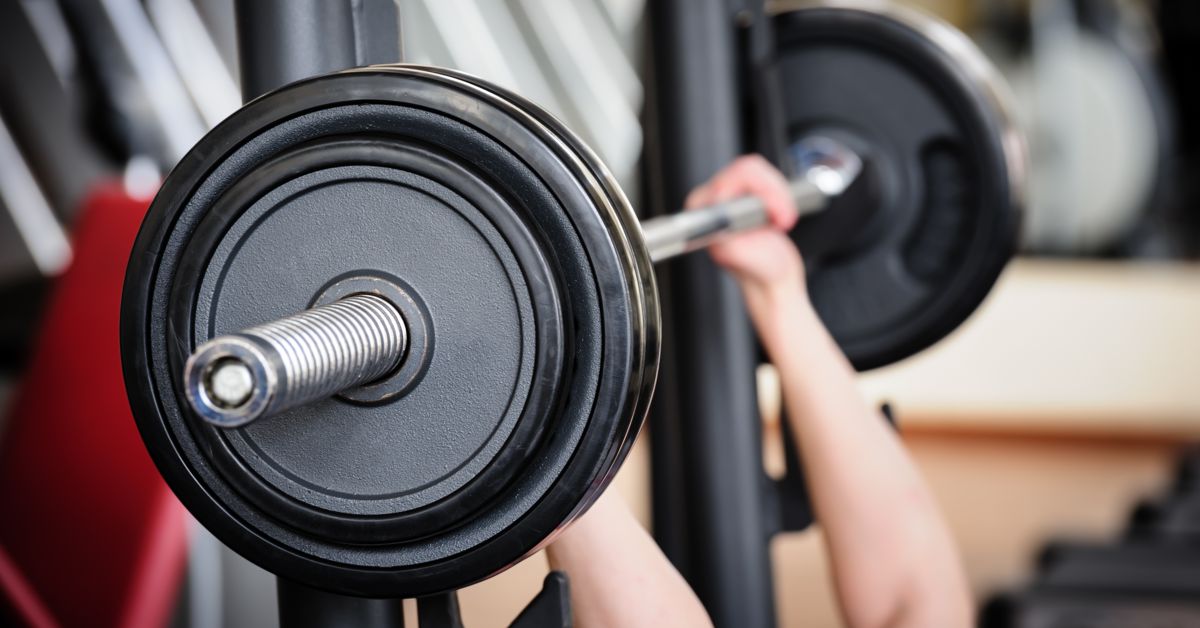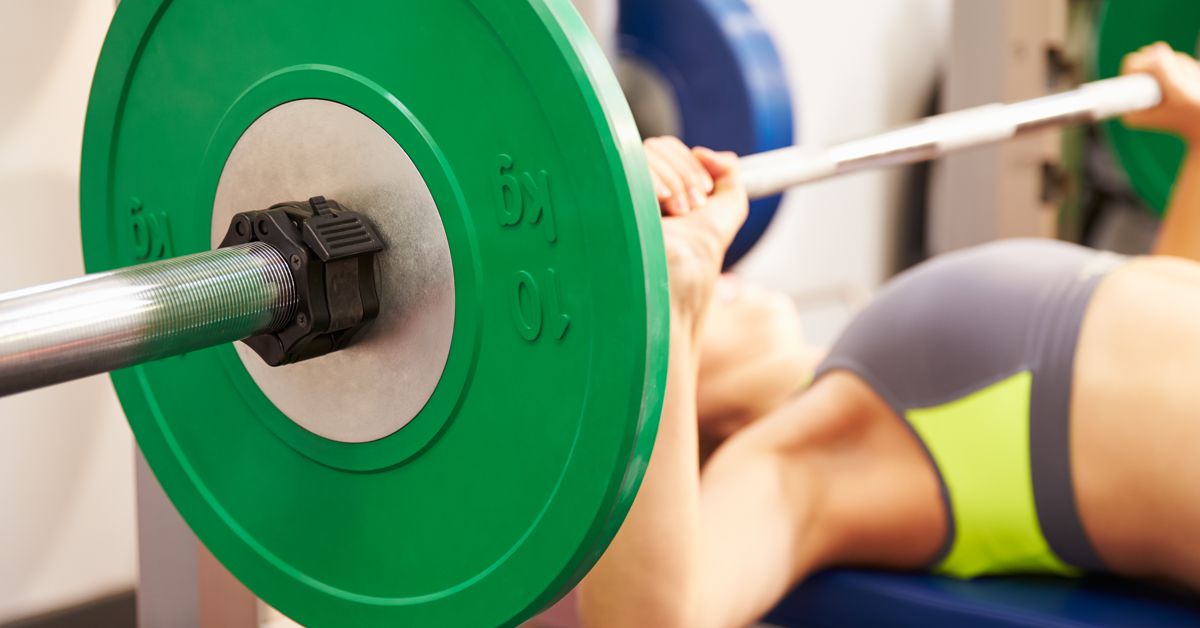A bench press is a weightlifting exercise (pushing movement) that is popular among bodybuilders and other athletes.
It is a type of resistance training that is performed while lying on a bench, using a barbell or a set of dumbbells to push a weight up with the arms.
This movement is a compound exercise, meaning that it works multiple muscle groups at the same time.
The primary muscles involved in the bench press are the chest, shoulders, and triceps.
By performing the exercise regularly, these muscles can become stronger and more defined.
In addition to building upper body strength, this exercise can also improve muscle endurance and coordination.
It's a versatile exercise that can be incorporated into a variety of workout routines, making it a popular choice among fitness enthusiasts.
What muscles work during the bench press?
The bench press is a compound exercise that involves multiple muscle groups.
The primary muscles that work during the bench press are the chest muscles, specifically the pectoralis major and the pectoralis minor.
These muscles are responsible for moving the arms and are located on the front of the chest.
In addition to the chest muscles, the bench press also works the triceps, which are located on the back of the upper arm.
The triceps are responsible for extending the elbow, and are used to push the weight up during the bench press.
The shoulders, or deltoids, are also engaged during the bench press.
The front and middle deltoids help to move the arms forward, while the rear deltoids assist in retracting the shoulder blades.
Other muscles that are used during the bench press include the latissimus dorsi, which are located on the upper back and help to stabilize the body during the exercise, and the trapezius, which are located in the upper back and neck and help to keep the shoulders in place.
What are the benefits of bench pressing?
There are many benefits to performing the bench press, both for overall fitness and for specific muscle groups. Some of the most notable benefits include:
1. Improved upper body strength: The bench press is a compound exercise that works multiple muscle groups in the upper body, including the chest, shoulders, and triceps.
By performing the exercise regularly, these muscles can become stronger and more defined.
This can help to improve overall upper body strength and power, which can be beneficial for activities such as pushing, pulling, and lifting.
2. Enhanced muscle endurance: In addition to building strength, the bench press can also improve muscle endurance.
By performing the exercise repeatedly over time, the muscles can become better able to withstand fatigue and sustain activity for longer periods of time.
This can be beneficial for activities such as sports and other physical activities that require sustained muscle activity.
3. Improved coordination: The bench press is a complex exercise that involves multiple muscle groups working together.
By performing the exercise regularly, the body can learn to coordinate the movements of these muscles more effectively.
This can improve overall coordination and balance, which can be beneficial for activities such as sports and other physical activities.
4. Increased bone density: Resistance training exercises such as the bench press can help to increase bone density.
This is because the stress of lifting weights causes the bones to adapt and become stronger.
This can help to reduce the risk of osteoporosis and other conditions that cause bones to become weak and fragile.
How often should I Bench press?
How often you should perform the bench press depends on a number of factors, including your fitness goals, your current level of strength, and your overall training routine.
In general, it is recommended to perform the bench press at least twice per week, with at least one day of rest in between sessions.
If you are new to weightlifting or are just starting to incorporate the bench press into your routine, it is important to start slowly and gradually increase the amount of weight and the number of repetitions you perform.
This will help to avoid injury and allow your muscles to adapt to the demands of the exercise.
As you become more experienced with the bench press and your strength increases, you may want to increase the frequency of your workouts.
This can help to continue challenging your muscles and promoting further gains in strength and muscle mass.
It is also important to vary your workouts to avoid plateaus and keep your muscles challenged.
In addition to the bench press, you can incorporate other exercises that work the chest, shoulders, and triceps, such as the push-up, or the tricep extension.
This is a great question, and if you want to answer that question, you should read our article on the topic.The article answers a very controversial question that the fitness community has been debating for years:
Who shouldn't bench press?
While the bench press is a popular and effective exercise, it is not suitable for everyone.
In general, it is not recommended for individuals who have certain medical conditions or injuries that could be exacerbated by the exercise.
For example, individuals with back or shoulder injuries may want to avoid the bench press, as the exercise can put additional strain on these areas.
It is also not recommended for individuals with certain heart conditions, as the exercise can increase the heart rate and blood pressure.
In addition, individuals who are pregnant or have recently given birth should avoid the bench press, as the increased abdominal pressure from the exercise can be harmful to the baby.
It is also not recommended for individuals with osteoporosis, as the added stress on the bones can increase the risk of fractures.
If you are unsure whether the bench press is appropriate for you, it is always a very good idea to consult with a fitness professional or healthcare provider before starting any new exercise program.
They can provide guidance and advice on the best exercises for your individual needs and goals.
Safety Tips
To perform a bench press safely, it is important to follow a few key steps.
First, choose a weight that is appropriate for your fitness level and avoid lifting too much weight too soon.
Start with a lighter weight and gradually increase the amount as you become stronger.
Next, lie on the bench with your feet flat on the ground and your back against the bench.
Hold the weight using a grip with your palms facing up, your hands slightly wider than shoulder-width apart.
Slowly lower the weight down to your chest, keeping your elbows close to your body.
Then, press the weight upwards until your arms are fully extended, exhaling as you push the weight up.
It is important to maintain good form while bench pressing to avoid injury. Avoid arching your back or bouncing the weight off your chest, and keep your feet flat on the ground to provide a stable base. Also, make sure to have a spotter nearby to assist you with the weight if necessary.
In addition to these safety tips, it is important to warm up properly before performing any weightlifting exercise.
This can include stretching and light cardio to get your muscles and joints warm and ready for the workout.
Different Angles
Bench pressing at different angles can affect the activation of the chest muscles, as well as the muscles in the arms and shoulders.
For example, a bench press performed with a narrow grip will target the triceps muscles in the arms more, while a wider grip will target the chest muscles more.
Incline bench pressing, where the bench is set at an angle, will also activate the chest muscles differently than a flat bench press.
An incline bench press targets the upper chest muscles more, while a flat bench press targets the middle and lower chest muscles.
Overall, bench pressing is a great exercise for building upper body strength, but it is important to follow proper form and safety guidelines to avoid injury.
By starting with a lighter weight and gradually increasing the amount, as well as having a spotter and warming up beforehand, you can safely and effectively perform this popular weightlifting exercise.
How should I progress with bench press?
As with any exercise, it is important to progress gradually with the bench press to avoid injury and ensure continued gains in strength and muscle mass.
There are several ways to progress with the bench press, including increasing the weight, increasing the number of repetitions, and incorporating variations of the exercise into your routine.
One of the simplest ways to progress with the bench press is to gradually increase the weight you are using.
Start with a weight that is comfortable to lift, and gradually increase the weight as you become stronger.
This will help to continue challenging your muscles and promoting further gains in strength.
In addition to increasing the weight, you can also progress by increasing the number of repetitions you perform.
Start with a manageable number of repetitions, such as 8-12, and gradually increase the number as you become stronger.
This will help to improve muscle endurance and stamina.
Another way to progress with the bench press is to incorporate variations of the exercise into your routine.
For example, you can try using different grip widths, using dumbbells instead of a barbell, or performing the exercise on an incline or decline bench.
These variations can help to target different muscle groups and keep your workouts challenging and effective.
Is bench pressing better than push ups?
This is a great question, and if you want to answer that question, you should read our article on the topic.
The article answers a very controversial question that the fitness community has been debating for years: is bench pressing better than push ups?

Leave A Comment